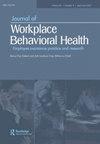推进社会工作者的工作参与:构建监管模式和工作需求资源模型
IF 0.8
Q3 PUBLIC, ENVIRONMENTAL & OCCUPATIONAL HEALTH
引用次数: 2
摘要
摘要本研究旨在研究两种被称为评估(即评估目标导向手段的倾向)和运动(即行动导向)的调节模式如何与工作投入(WE)相关。根据工作需求-资源模型,假设评估和运动分别通过工作需求、工作和个人资源与WE间接相关。257名社会工作者通过填写问卷参与了这项研究。结果表明,由于对工作需求的评估增强,评估水平较高的社会工作者往往会经历较低的WE,而那些行动能力较高的社会工作人员则报告称,通过触发工作和个人资源,他们的WE较高。本文章由计算机程序翻译,如有差异,请以英文原文为准。
Moving forward to social workers’ work engagement: Framing the regulatory modes and the job demands-resources model
Abstract This research aimed to study how two regulatory modes called assessment (i.e., tendency in appraising goal-directed means) and locomotion (i.e., action-driven orientation) were associated with work engagement (WE). According to the job demands-resources model, it was hypothesized that assessment and locomotion were indirectly associated with WE mediated respectively by job demands and by job and personal resources. A sample of 257 social workers participated in the study by completing a questionnaire. Results suggested that social workers higher in assessment tended to experience lower WE because of an augmented appraisal of job demands, while those higher in locomotion reported a higher WE through triggering job and personal resources.
求助全文
通过发布文献求助,成功后即可免费获取论文全文。
去求助
来源期刊

Journal of Workplace Behavioral Health
PUBLIC, ENVIRONMENTAL & OCCUPATIONAL HEALTH-
CiteScore
2.40
自引率
6.70%
发文量
14
期刊介绍:
The Journal of Workplace Behavioral Health, retitled from Employee Assistance Quarterly to better reflect its expanded focus, presents innovative research, applied theory, and practical information to keep workplace human service administrators, counselors, and consultants up to date on the latest developments in the field. This refereed journal is an essential guide to best practice and research issues faced by EAP professionals who deal with work-related and personal issues including workplace and family wellness, employee benefits, and organizational development.
 求助内容:
求助内容: 应助结果提醒方式:
应助结果提醒方式:


